 1963-1965
1963-1965
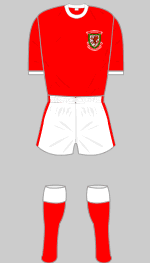
1963-1965
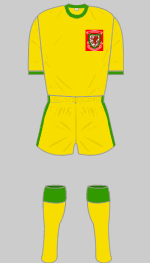
1963-1965 Change
Designer: Umbro
Modern, crew necks were introduced in 1963. The yellow change kit was worn twice in away games against Denmark and the Soviet Union.
 1965-1972
1965-1972
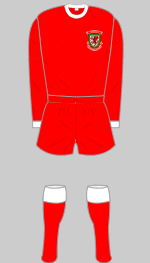
1965-1967
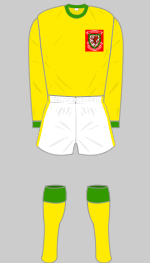
1965-1967 Change
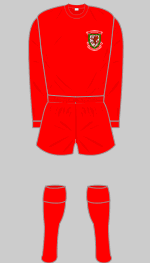
1967-1972
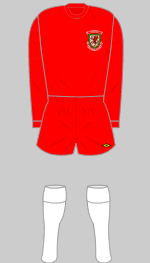
Aug 1971 v Romania
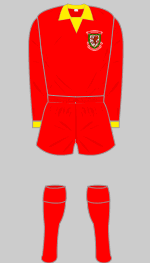
May 1972 v England
Designer: Umbro
A fashionable all-red strip appeared for the first time in 1966, initially with white trimmings and then, in 1967 in plain red. The all-yellow change kit was fundamentally unchanged but rarely, if ever, used. From 1967, yellow numbers appeared on the back of the shirts. Remarkably, this kit was used in 27 consecutive matches without a change kit being needed.
Yellow collars and cuffs appeared for a single match in May 1972, a 0-3 defeat at the hands of England. A Cardiff sports shop agreed to sponsor the Welsh team for this occasion and supplied a set manufactured by Bukta.
 1972-1974
1972-1974
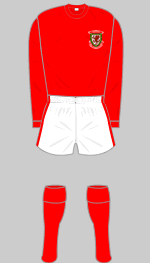
1972-1974
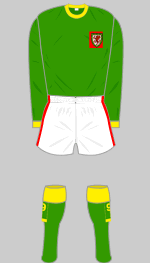
29 Sept 1973 v Poland
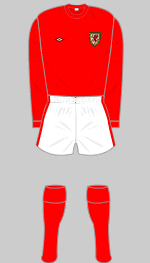
1974
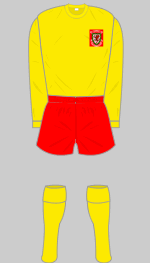
14 May 1974 v Scotland
Designer: Umbro
White shorts with Wales' signature stripe reappeared in 1972 and the crest was somewhat smaller than previous versions. The kit was slightly modified at the end of 1974, when Umbro's trademark appeared on the shirt and the motto was removed from below the crest. This version was worn in only three games, all European Championship qualifiers. The unusual green and yellow change kit was used just once in Katowice against Poland although there was no reason for the change, as Poland traditionally wear white shirts and red shorts. Another inexplicable change was made in May of the following year when Wales played at Hampden in plain yellow shirts.
 1975
1975
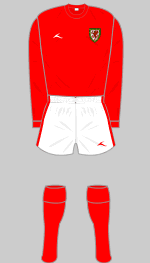
1975
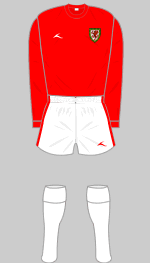
17 May 1975
v Scotland
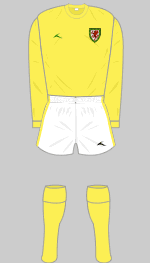
1975 Change
Designer: Bukta
For one calendar year, the FAW switched to Bukta as their kit supplier. The "home" strip was identical to the previous Umbro version aside from the Bukta logo. An attractive change kit in "daffodil yellow" and white was worn against Hungary and Luxembourg. The simplified FAW crest was also used.
 1976-1979
1976-1979
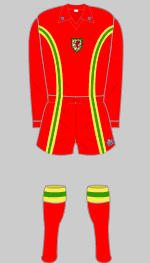
1976-1979
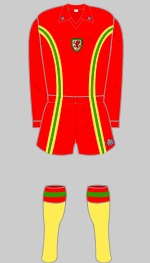
May 76 & Oct 77
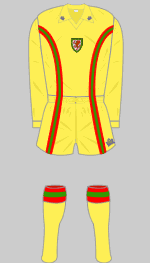
1976-1979 Change
Designer: Admiral
Admiral had quickly earned a reputation for their groundbreaking designs for English and Scottish clubs in the mid-70s. The FAW decided to adopt Admiral's iconic "tramline" design (favoured by Coventry City and Dundee). The result was one of the most popular Welsh kits of all time. For the first time, traditional red was combined with green and daffodil yellow, the colours reversed to excellent effect on the change kit. A short sleeved version was also produced in Aertex fabric for matches in hot weather; these were probably used for fixtures in Kuwait and Iran in 1977 and 1978 respectively. The yellow version was used only twice: a 0-1 defeat in Prague against Czechoslovakia in November 1977 and a 7-0 thrashing of Malta in a European Championship qualifier the following October. The home kit was worn with the yellow stockings from the change kit against Yugoslavia (May '76) and Scotland (Oct '77).
Match worn versions were manufactured in cotton with stitched crest and logos whereas the replica versions were made from cheap nylon and had heat applied plastic logos that broke up after a few washes.
<Wales 1946-1963 :
Home Internationals Index Page :
Wales 1980-2000>
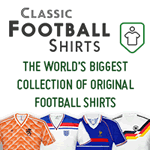
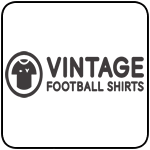
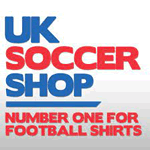
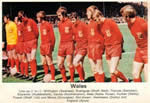 There was little for Welsh fans to cheer about during the 60s and 70s. A three-way share in the British Championship in 1970 and an appearance in the quarter-finals of the European Championships in 1976 (then played over two legs - only the last four qualified for the final stage at this time) being the highlights. The following year, they beat England 1-0, their first victory on English soil in 42 years and the only time they have won at Wembley.
There was little for Welsh fans to cheer about during the 60s and 70s. A three-way share in the British Championship in 1970 and an appearance in the quarter-finals of the European Championships in 1976 (then played over two legs - only the last four qualified for the final stage at this time) being the highlights. The following year, they beat England 1-0, their first victory on English soil in 42 years and the only time they have won at Wembley.















